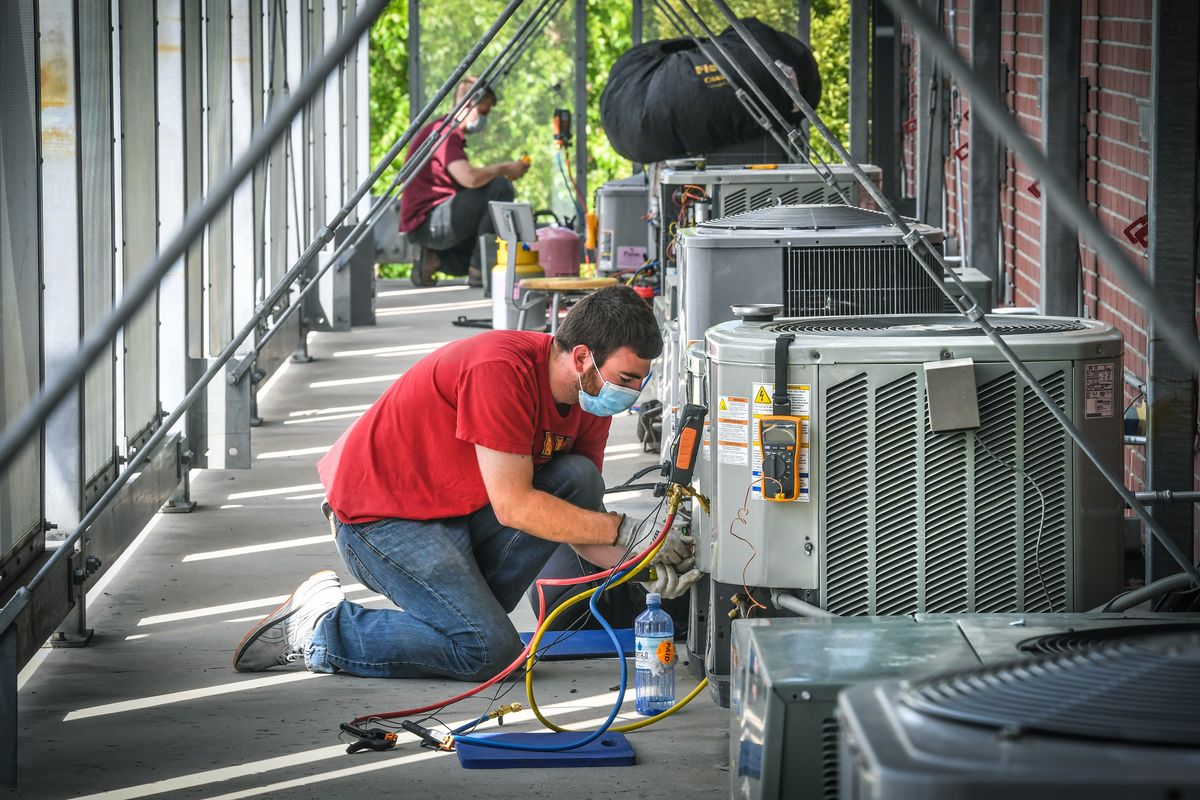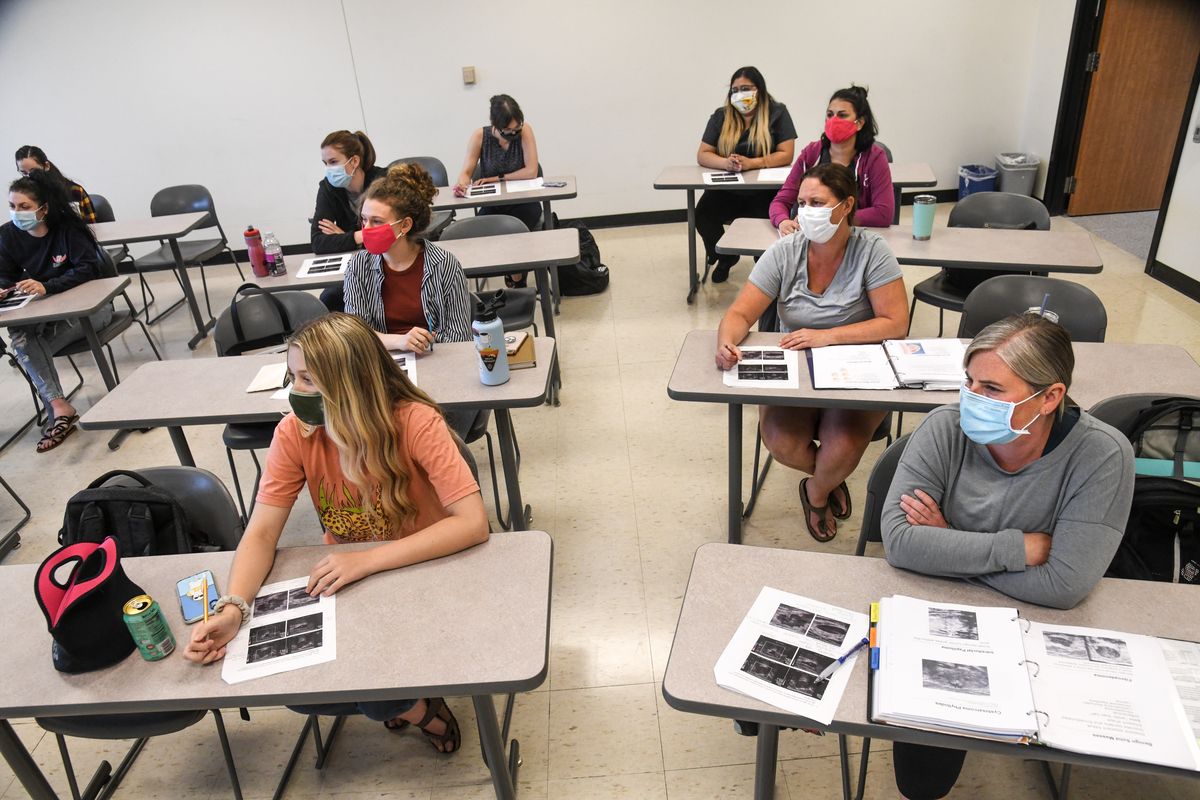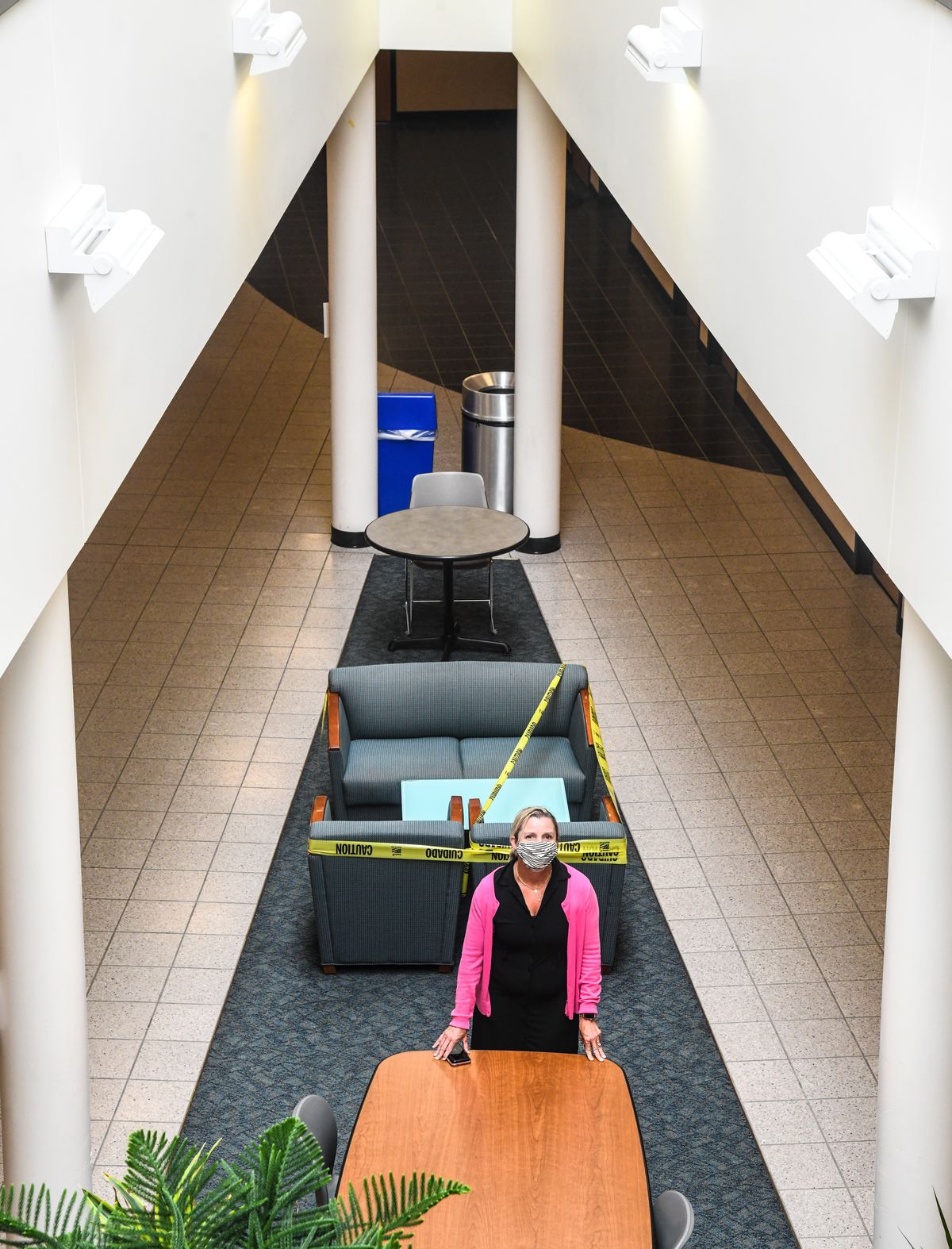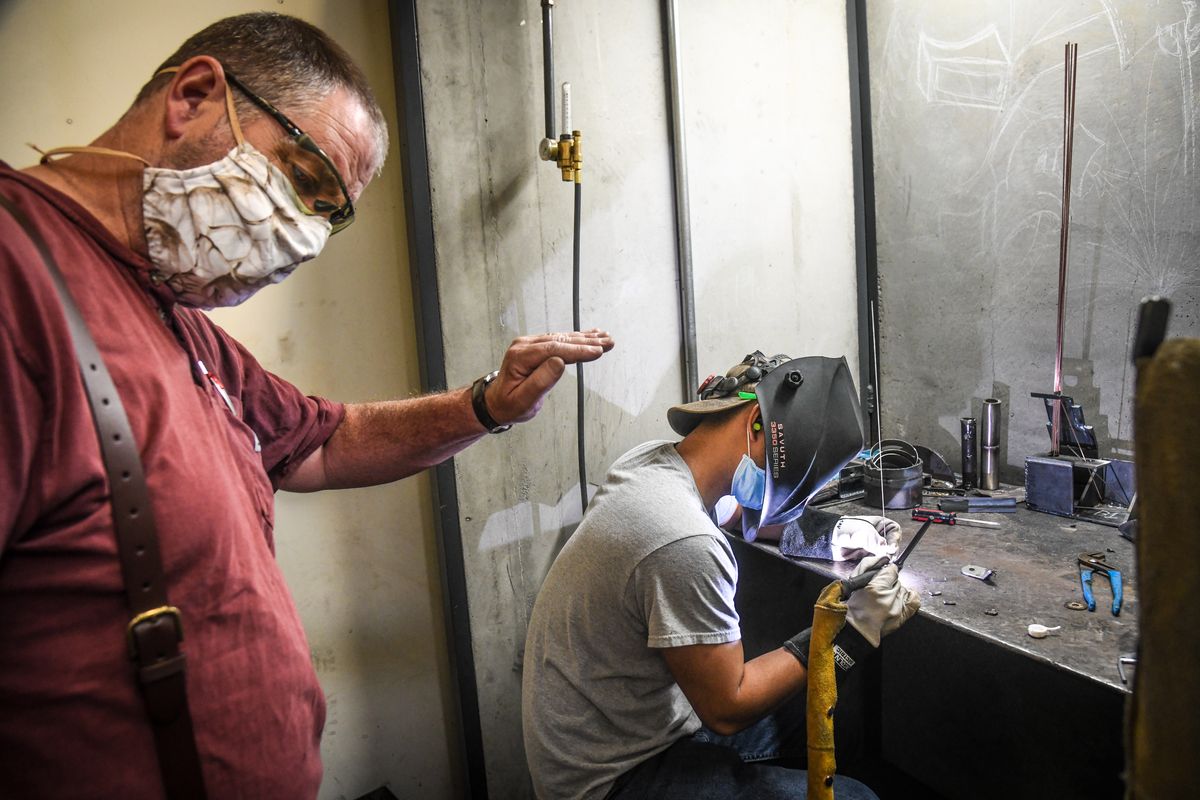What should students expect this fall? No easy answers for Washington colleges
Spokane Community College student Tyler Rice performs a check on an air conditioning unit during class on Thursday. (Dan Pelle / The Spokesman-Review)Buy a print of this photo
There are no easy answers for college administrators mulling how exactly to resume operations this fall.
In late June, Washington State University announced it would start the fall semester with a mix of online and in-person classes before transitioning to an entirely online format for the brief period after Thanksgiving break – a move intended to limit students’ holiday traveling and thus curb the spread of the novel coronavirus.
But a month later, on Thursday, the university reversed course, citing a recent surge in coronavirus cases and related deaths both in the region and across the country. With few exceptions, WSU courses from the Pullman, Vancouver and Tri-Cities campuses will be taught remotely this fall.
“Our fall 2020 semester at WSU Pullman will not be what we hoped, wanted or planned,” President Kirk Schulz and other administrators said in a statement. “We make this decision with the health and safety of our students, faculty and staff foremost in our minds, and that principle will continue to guide us going forward.”
The announcement laid bare the difficulty of planning for the future during a pandemic that shows little sign of slowing in the United States.
The stakes of such decisions are high: If colleges reopen without adequate safeguards in place, they risk facilitating virus outbreaks that would endanger students, faculty and staff and be costly to get under control. But if they keep courses entirely online, they risk driving away students who expect a traditional college experience for their tuition dollars, as well as those with limited access to technology and the internet.
Though they’re required to follow detailed guidelines released by Gov. Jay Inslee’s office, other schools in Eastern Washington are taking various approaches to reopening and resuming operations.
Weeks ago, Eastern Washington University said its classes would remain primarily online, while Whitworth University was among the first to announce a return to campus life and primarily in-person instruction.
Spokane Community College and Spokane Falls Community College are taking a “hybrid” approach and already have resumed some in-person classes in hands-on programs such as nursing and welding.
Gonzaga University President Thayne McCulloh has said for weeks that the school aims to provide some face-to-face classroom experience this fall, though the administration has been slow to roll out details of its reopening plan.
Spokane Community College welding instructor Jeff Schwab, left, shields his eyes as student Savuth Vann welds during class on Thursday, July 23, 2020. SCC students and instructors have returned to in-person classes but are taking steps to curb the spread of the novel coronavirus, including wearing masks and socially distancing. (Dan Pelle / The Spokesman-Review)Buy a print of this photo
In an interview Thursday, James Angelosante, Gonzaga’s vice president for administration, said students should expect a mix of online and in-person instruction, with some classes divided into smaller groups that would take turns in physical classrooms to allow for social distancing. Gonzaga also expects freshmen and sophomores to continue living on campus, two students per dormitory, he said.
Angelosante said Gonzaga is working closely with local health officials, but he emphasized that the university is caught in a “dynamic environment” and can’t promise that any plan will hold if the coronavirus situation worsens.
Some frustrated students have demanded more clarity from the Gonzaga administration and say they feel left in the dark.
“Regardless of the decision that’s made, most of the other major colleges have released definitive statements on what they’re doing and what students should expect. And we just really haven’t heard,” Erin Sellers, a senior at Gonzaga, said Thursday.
“It’s been a little frustrating because people are starting to move back into Spokane,” Sellers said. “People have signed leases. People are trying to decide if they should change the classes that they’re registered for and just make plans. And it’s really hard to set anything in stone now.”
Later Friday, in a letter to students and families, McCulloh said administrators would seek clarification over the weekend about new gathering and business restrictions that the governor announced on Thursday.
“These restrictions could have significant impact upon our students’ ability to learn and live in a manner that bears the hallmarks of a vibrant campus community; they could have serious impacts on campus food service, fitness centers and university housing,” McCulloh wrote.
He promised to provide another update by Tuesday.
“I recognize that the uncertainty we are dealing with makes this a very frustrating set of circumstances within which to plan and operate,” he wrote. “I want to assure you that we will do our best to communicate with you as directly and transparently as we possibly can.”
Costs of the coronavirus
Washington’s colleges and universities took the unprecedented and costly step of moving most courses online in mid-March. The intervening months have been filled with planning and speculation about the shape of the fall term.
“We certainly incurred some significant costs in the spring by closing our campus in March,” said Larry Probus, Whitworth’s vice president for finance and administration.
Many of the initial expenses were relatively small on their own, Probus said. Whitworth granted refunds and credits for students who had paid for room and board but no longer planned to stay on campus. It purchased personal protective equipment and paid for increased cleaning and sanitization of buildings.
“Fortunately, we were in a pretty strong financial position prior to the pandemic, and we had reserves sufficient to cover those costs, so I think we’re going to end the (fiscal) year OK,” Probus said. “We’ll have an operating deficit, but again, we have reserves to cover that.”
Reopening Whitworth’s campus will not mean a return to business as usual. While the university has promised a return to campus life, there will be increased demand for physical classroom space.
“We won’t have as many students in any given class,” Probus said. “We will be reducing the number of students in class for distancing purposes. And to do that, that means every student will need to take some classes online.”
And there will be additional costs. Whitworth is hiring two full-time contact tracers to monitor the spread of the virus among students, faculty and staff, and the university plans to set aside 90 beds in a campus residence hall for any students who may need to quarantine. Under normal circumstances, those beds would be filled with underclassmen paying for room and board.
In his letter, McCulloh said Gonzaga has procured “large amounts” of personal protective equipment and spent more than $1 million on technology upgrades to allow for live video feeds from classrooms.
Then there’s the question of enrollment, which can be a moving target in the best of times.
Angelosante said Gonzaga has seen a 10% drop in freshman enrollment for the fall but expects to register more law students and graduate students than in previous years. Administrators at SCC and SFCC said they, too, have seen sudden downturns in applications following years of gradual enrollment declines.
Probus said Whitworth’s enrollment figures look “very encouraging” for now.
“But there’s still a question mark around what the next two months will bring before classes start,” he said.
The financial impact of the pandemic will result in job losses.
All Washington state agencies, including public colleges and universities, have implemented hiring freezes and other belt-tightening measures as the pandemic created a shortfall in state tax revenue.
Hundreds of EWU employees have been notified they may be furloughed or laid off as the university is forced to slash tens of millions of dollars from its operating budget. EWU has struggled to meet its enrollment targets for years and was working to reduce spending before the pandemic hit.
WSU is preparing for a state funding reduction of up to 10%, or $37.2 million, but says it may be able to avoid systemwide furloughs. That’s unless the state orders deeper spending reductions or enrollment falls severely short of projections, according to a statement from Stacy Pearson, WSU’s vice president for finance and administration.
For students, the pandemic has affected not only instruction but many other services that colleges provide, including housing, dining and recreation.
Gonzaga, for example, has closed its study-abroad campus in Florence, Italy, for the fall. And WSU is closing its residence halls to a majority of undergraduate students, making exceptions for those with no other place to live.
At SCC, the campus cafeteria has been repurposed as a classroom for nursing students, who must do some coursework in person, said Jenni Martin, the college’s vice president for instruction. The size of the cafeteria allows for social distancing, she said.
EWU Provost David May said some students in health-related fields and other hands-on programs will continue taking in-person courses and lab sessions when the subject matter requires it.
“There’s of course learning outcomes – some things that we need students to know – that just can’t be done online,” he said.
But the vast majority of EWU courses will remain online for the foreseeable future.
“We are very committed to the reality that our decision-making isn’t driven by a calendar. It’s driven by the progress toward a vaccine. It’s driven by the progress of this disease in our society,” May said. “And so we are waiting to see how the fall starts to unfold, or how the late summer starts to unfold, before we make decisions about the future.”
Students face inequities, challenges
Sellers never imagined her senior year at Gonzaga would be like this. The 20-year-old theater major has spent most of the past few months at home in Spokane, taking classes online and doing remote public relations work for the Innovia Foundation.
Sellers said her professors did the best they could when classes moved online in March, and she understands why the move was necessary. But the rest of the spring semester was not the educational experience she’d hoped for.
“It’s kind of impossible to take an acting class online,” she said. “You can’t really do scenes with anybody or get instant feedback. It’s just a really different experience.”
Sellers said she couldn’t take a semester off without jeopardizing her financial aid. She said she can manage online courses from home in Spokane, but she wouldn’t be able do so in her tiny hometown of Weippe, in north-central Idaho.
“The internet service there isn’t good enough for me to do Zoom classes, so I’m going to have to be in Spokane to take things online,” she said. “Some people are going to have extenuating circumstances and really need time to plan in advance where they’re going to be.”
SFCC President Kimberlee Messina said access to technology is a significant barrier for many low-income students and those who live in rural areas.
SFCC and other institutions have invested in more laptops and other devices to loan to students during the pandemic. But many still need practical places to work and study, such as the campus library.
“Equity is a real issue,” Messina said. “We were able to get students access to laptops, but access to reliable internet at home is not something we were able to help them with.”
At WSU, senior Jessica Garibay said she understands administrators’ decision to keep courses online-only this fall. But she, too, believes the quality of her education has suffered.
A business major and first-generation student from Wenatchee, Garibay, 21, said some of her lecture-based courses now take the form of PowerPoint presentations that are difficult to follow.
“I always have opted out of taking online classes because I know they are not for me,” she said.
Garibay, who works for WSU mentoring peers who are newer to campus, said she knows of at least one student who decided to drop out and attend a community college because of the coronavirus situation.
Garibay – and many other students – believe WSU should lower tuition for those taking courses online and not getting the on-campus experience they had hoped for. But because she has only one year left, Garibay said she will continue pursuing her degree no matter the circumstances.
WSU President Schulz said the university has no plans to reduce tuition in a livestreamed question-and-answer session on Friday. Online courses require just as many faculty and staff members as in-person classes, plus technology upgrades, he said.
“It’s a different experience, but we still have a lot of the same costs – or more – to provide the educational experience that Cougs would and should expect,” he said.
Schulz said he understands that some students may choose to leave WSU over the decision to go online-only. But he urged all students to continue pursuing their education however possible and suggested those who leave WSU transfer to a community college.
Schulz cited research showing students who drop out of college rarely return later to finish their degrees. A college degree, he said, is key to economic success.
“It’s really important to your future, your family’s future and your state’s future,” he said.





